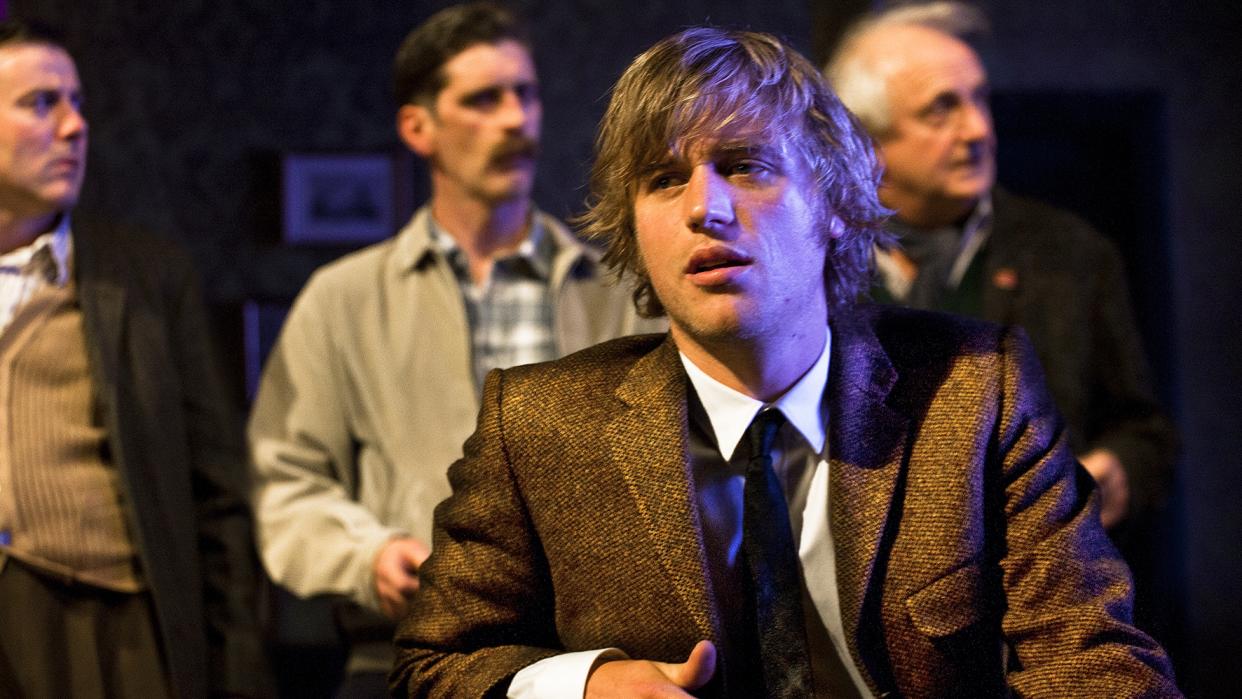London Theater Review: ‘Hangmen’ by Martin McDonagh

How’s this for irony? In the middle of the Swinging Sixties, Great Britain abolished hanging. On Nov. 9, 1965, it stopped swinging. Great news for progressives; less so for Harry Wade, the nation’s second-best hangman, in Martin McDonagh’s “Hangmen.” As characters go, Wade is pure McDonagh – right up there with the two-bit hitmen of the writer’s film “In Bruges” – and that’s very welcome, given London hasn’t seen a new play by the Irishman since 2003. In its premiere at the Royal Court, “Hangmen” doesn’t disappoint. It might not hit the breathless delirium of pure farce, but it’s full of gallows humor, twistier than the summer of ’62 and much cleverer than your average comic caper.
We first meet David Morrissey’s Wade mid-execution, dispatching a man charged with murder, who protests his innocence in the strongest of terms. “They could have at least sent Pierrepoint,” he finally yells (referring to England’s well-known longtime executioner), before dropping through the floor, a rope snapping taut in his wake. “We’ll have none of this going down int’ bloody report, neither,” Wade scowls.
Two years later, post-abolition, Wade’s running a pub in Oldham, an industrial town in the north of England. At his bar are a gaggle of star-struck alcoholics, all willing to confirm that Wade had more nous with the noose than anybody, Pierrepoint included. He’s cock of the walk, a king in his castle. His pub, his rules.
That is, until Johnny Flynn’s slick Mooney walks in. With quick wit and a ruffled mop-top, he bamboozles the boozers with his quick metropolitan wit. Mooney flirts with Harry’s wife, then with his teenage daughter — he’s definitely up to something, though it’s never clear what. Is he a journalist out for a scoop or something much, much darker?
All this makes a cracking comic thriller, complete with petty, roundabout dialogue and a series of startling U-turns. McDonagh’s perfectly at home in this sort of backwater setting, full of imbeciles and idiosyncrasies, and his dialogue is more knowing than a pub-quiz champion. Wade’s a perfect Basil Fawlty-esque foil, and Morrissey, in his bowtie and tiny, trim moustache, plays up his pomposity, while Mooney makes a great mystery man, changing tack so regularly that there’s no pinning him down. Flynn finds just the right slippery charisma and charm.
However, McDonagh’s real concern, smuggled in like a file in a cake, is with history: the way it repeats itself, the way it resists change and, even then, only changes gradually, the way it looks in hindsight.
This is 1965: the year of “Satisfaction,” the Race Relations Act and the first major obscenity uttered on British television. Not that you’d know it in Oldham. Wade’s pub looks positively Victorian in Anna Fleischle’s first-rate design: an oak saloon bar, thick with cigarette smog and not a jukebox in sight. Nobody’s swinging in Oldham. Well, almost nobody. Old habits die hard, after all.
The regulars’ attitudes aren’t much better: sexist, racist, homophobic and prehistoric. Even modern-man Mooney chuckles at a “funny looking black fella” in the paper. Chances are none of this lot questioned capital punishment until recently. Indeed Wade rates it as the most dignified death possible. “You haven’t seen all the other methods of execution…” a reporter observes. What, you wonder, are our comparable blindspots? Where will 2065 prove us wrong? Half a century is a long time, but it’s also no time at all.
There’s no certainty like that of a hangman. Imagine doubting, even for a second, the guilt of those you dispatch. You can’t do the job without assuming an absolute faith in the system. That’s McDonagh’s real target: Harry’s steadfastness, his gaggle of cronies nodding him on, his inability to consider alternatives — dismissing his teenage daughter as “mopey” and the plain-speaking old chap at the bar as senile, when they’re the very people he (and we) should heed.
The measure of McDonagh’s mastery is his use of form. The whole point of a plot twist is, of course, that you don’t see it coming; the way it disrupts every pattern and prediction. At the same time, though, “Hangmen” pays its dues to the past: it’s an Ortonesque farce, complete with stiff corpses and cock jokes, with a debt to Pinter’s enigmatic hoodlums. Director Matthew Dunster’s production teeters on the edge of pastiche and, even if you wise up to its twistiness, there’s a lot to love. Expect this one to hang around.
Related stories
CBS Films in talks for 'Psychopaths'
Original screenplays in the mix
Get more from Variety and Variety411: Follow us on Twitter, Facebook, Newsletter
